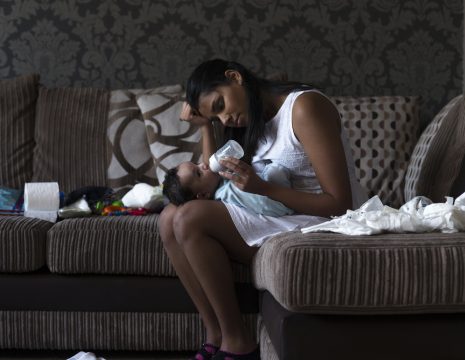Whether mothers breastfeed, bottle feed or both, they face struggles with guilt and stigma
We’ve all heard the saying ‘breast is best’. If this is the case, why are so many women made to feel ashamed when nursing in public? And what if breastfeeding just isn’t the right choice – or indeed isn’t an option – in your circumstances?
Here we look at the different attitudes women encounter around feeding their babies, and explore what work is being done to fight stigma.
Breastfeeding and bottle feeding statistics
A recent UK study found that more than 80% of women initiate breastfeeding, yet less than 1% of mothers exclusively breastfeed to six months – the timeframe recommended by the WHO. So the vast majority of babies receive at least some formula in their first few months.
At six to eight weeks after birth, the breastfeeding rate for England is 44.4% (2016-17). On a worldwide scale, this figure is low. In Norway, for example, 71% of babies are still being breastfed at six to eight weeks.
Nutrition lead for the Royal College of Paediatrics and Child Health, Professor Mary Fewtrell, cited a number of possible reasons for the UK’s low numbers, including a lack of local support, public health cuts, inconsistent messaging from healthcare professionals, social stigma and lack of family support.
The stigma of breastfeeding in public
It’s illegal to ask a woman who is breastfeeding their child to leave a public place. And yet a Scottish survey found that more than a quarter of new mums have been made to feel uncomfortable when breastfeeding in public.
A recent Dispatches documentary, Breastfeeding Uncovered, highlighted the negative attitudes women continue to face for breastfeeding in public. The presenter, Kate Quilton, said she herself had been made to feel like a ‘social outcast’ for publicly nursing her baby. She said she had encountered ‘lots of raised eyebrows’ and ‘a few people tutting’.
Fighting back
After the Dispatches documentary was aired, hundreds of women took to social media to share their own experiences, The Mail Online reported. Some told of how they had been made to feel ashamed of public breastfeeding by passers-by or restaurant staff. Others shared photographs of themselves nursing while out and about, in order to help others feel more confident in doing the same.
Earlier this year, a Northern Ireland campaign called #NotSorryMums was launched with the same aim. And in the Philippines, to celebrate World Breastfeeding Week this week, several hundred women gathered in a stadium to nurse their children in an act of solidarity.
While for many women breastfeeding is simply not an option, a 2016 study found that 40% of women stop breastfeeding after six weeks because they felt judged – or feared being judged. So the recent spate of campaigns, both in the UK and worldwide, are vital in helping more women feel that breastfeeding is an option. And it seems to be working – since 2010, there has been a 10% increase in the number of babies being breast fed for at least the first six months.
Tackling the stigma of bottle feeding
Women who bottle feed their babies face a different kind of stigma. A 2016 article by The Conversation argued that women face a catch-22: breastfeed their babies and face criticism for nursing in public, or bottle feed and face criticism from those who feel breastfeeding is a more ‘valid’ choice.
The article cited a study which found that the majority of mothers who supplement breastfeeding with formula are made to feel guilty, stigmatised, defensive, and dissatisfied over their decision to top-up or swap from breast to bottle. Mothers who initiate exclusive breastfeeding but stop, and mothers who intend to exclusively breastfeed during pregnancy but are unable to do so, are at a much higher risk of experiencing guilt and dissatisfaction too.
Earlier this year, a hospital trust was criticised for describing mothers who use formula as “artificially” feeding babies. The backlash resulted from a letter from Worcestershire Acute Hospitals NHS Trust, in which it told mothers it would no longer provide formula milk in its maternity units to those who decided not to breastfeed. The information was placed under the heading “What do I need to bring with me if I wish to artificially feed my baby?”
One woman who said she had been unable to breastfeed said the letter’s wording made her “sick to the stomach”.
However, in June 2018, The Royal College of Midwives’ new position statement makes it explicitly clear that women should be supported if, after being given advice, information and support, they opt to bottle feed using formula milk.
My Possible Self is a mental health app that can help you reduce stress, anxiety and mild-to-moderate depression in eight weeks. It can be useful for new parents who are adapting to their new family commitments. Modules like Managing Stress and Overload may be particularly useful. Download the app now.
